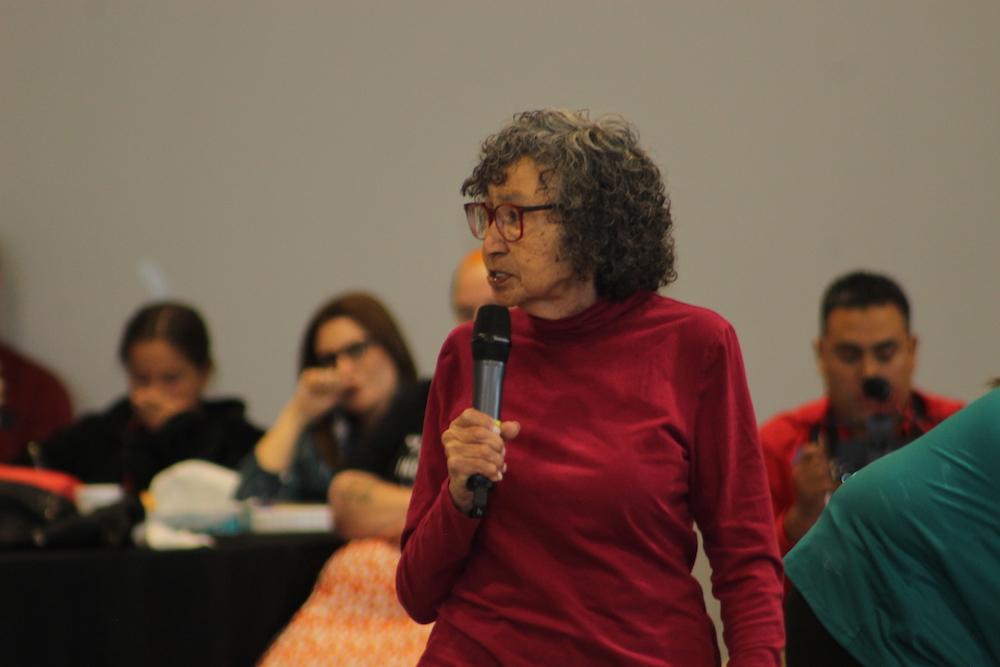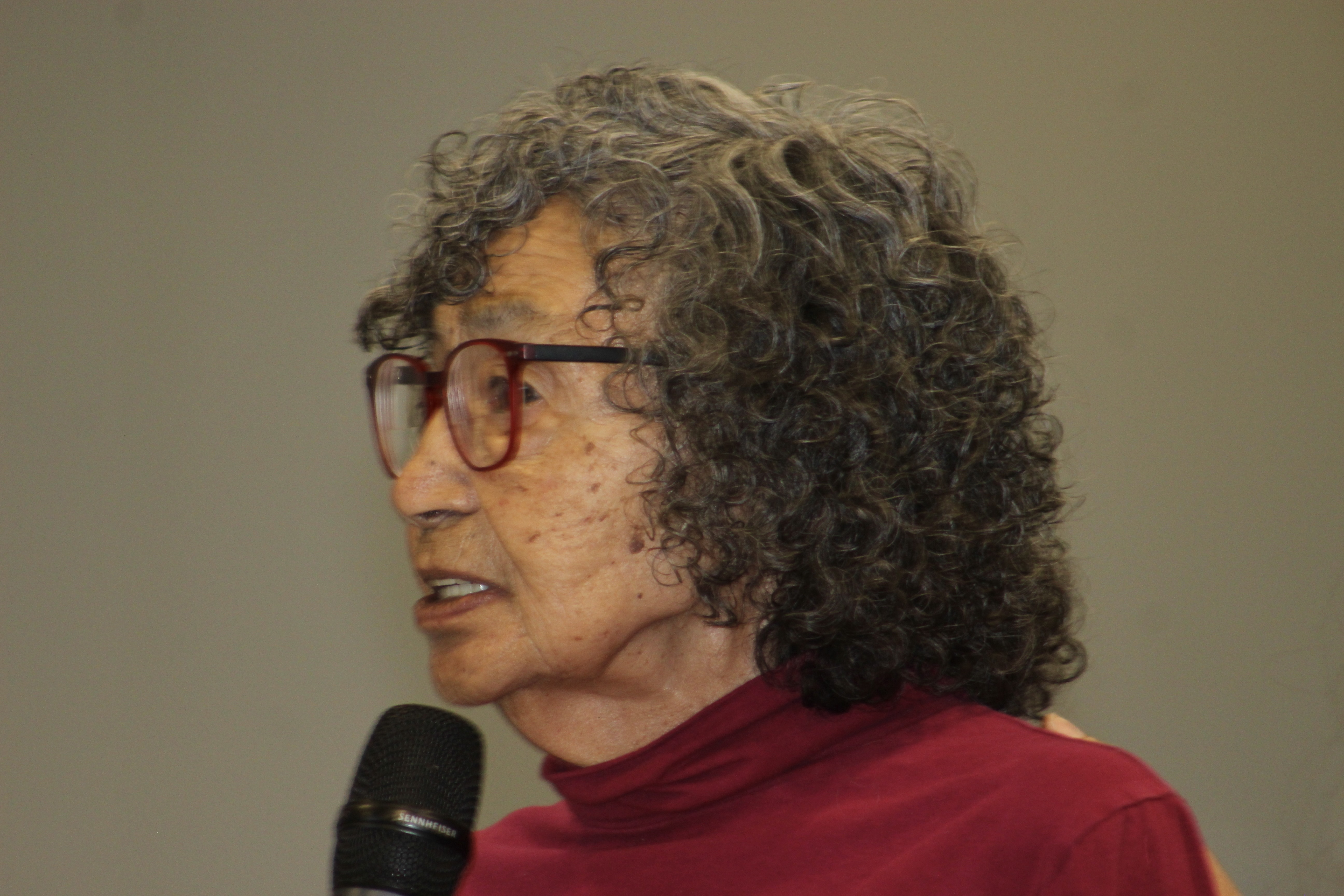
- Details
- By Levi Rickert
MILLE LACS INDIAN RESERVATION — The seventh listening session of the year-long Road to Healing tour of Native communities stopped at the Mille Lacs Band of Ojibwe in Onamia, Minnesota on Saturday, June 3, 2023.
The listening session, led by Interior Secretary Deb Haaland (Laguna Pueblo) and Assistant Secretary - Interior Affairs Bryan Newland (Bay Mills Indian Community), was part of a year-long series launched in July 2022 to provide Native Americans affected by the federal Indian board school system an opportunity to share their experiences and the effects on their communities.
“I want to thank you for your willingness to come to share your stories with us today. Every Native American I know has been affected by the assimilation policies of the Indian boarding schools,” Secretary Haaland said in her introductory remarks. “Through The Road to Healing our goal was not only to create opportunities for people to share their stories, but also for us to connect with communities. Please note we still have so much healing yet to take place in our communities.”
“Federal Indian Boarding School Policies touched every Indigenous person I know,” Haaland said. “We all carry this painful legacy in our hearts. Deeply ingrained in so many of us is the trauma that these policies and these places have inflicted.”
Mille Lac Band of Ojibwe Chief Executive Melanie Benjamin welcomed the attendees to her tribal homelands. During her remarks she likened the Indian boarding schools experience to the situation in Ukraine today, where the Russian troops have forcibly removed Ukrainian children from their families and taken them.
“In February the U.S. State Department reported Russians had taken 6,000 children from their families. The number is now over 20,000. The State Department called these actions war crimes,” Benjamin said. “You can dust off the Indian boarding school policies to see how the U.S. government took our children to further take our land.”
Newland said the Interior Department has identified 21 Indian boarding schools that were operated in the state of Minnesota.
Much of the testimony heard at the listening session was similar to other stories told at previous listening sessions. Indian boarding school survivors or family members told stories of physical and emotional abuses encountered at the schools. Several mentioned how the abuse of alcohol played a factor in the family dynamics long after attending boarding schools. One woman spoke of being on the road of sobriety since 1979 because she realized she did not want alcohol to further destroy her life. She said learning her tribal language was a great source of healing as she learned to accept who she was as a Native person.
Grace T. Andreoff Smith (Yupik), 81, who has made her home in the Twin Cities for several decades, attended an Indian boarding school in Pitka’s Point, Alaska. She recounted how she was sent to the boarding school with a brother and cousin. She never saw her brother again after the day they arrived at the school.
“I would ask a nun, ‘Where is my brother?’” Smith testified. “The nun told me ‘None of your business.’ Then I would ask another nun the same question and be told again it was none of my business.”
Decades later, Smith was informed that her brother, Matthew, is buried in an unmarked grave in Seward, Alaska.

Minnesota Lt. Gov. Peggy Flanganan (White Earth Ojibwe) brought her 10-year-old daughter to the listening session so she could learn the history of what happened in boarding schools.
Flanagan told Native News Online that it is important that these stories are told and said she admires Secretary Haaland conducting the listening sessions because they are part of the healing process.
“I am grateful for those who were willing to tell their stories. It finally feels like these stories aren't just to share the trauma, but there will be action that will come from them. I think the federal government has the responsibility to provide trauma counseling so that our communities can heal,” Flanagan said.
With Saturday’s listening session, to date Haaland and Newland have held seven listening sessions. Previous hearings were in: Anadarko, Oklahoma; Pellston, Michigan; Mission, South Dakota; Gila River Indian Community, near Phoenix, Arizona, Many Farms, Arizona on the Navajo Nation; and Tulalip Indian Reservation, near Seattle, Washington.
https://nativenewsonline.net/sovereignty/boarding-school-experience-caused-one-woman-to-question-god#sigProId7d8249565f
More Stories Like This
Navajo Committee Advances $84M Transportation Improvement PlanNCAI Passes Two Emergency Resolutions on Immigration Enforcement Activities
Chickasaw Lighthorse Police Officer named Indian Country Law Enforcement Officer of the Year
Indian Gaming Association Rallies Broad Coalition Against Sports Event Contracts It Calls Illegal Threat to Tribal Sovereignty
Navajo Resources and Development Committee Issues Notice on Livestock Inspection Requirements
Help us defend tribal sovereignty.
At Native News Online, our mission is rooted in telling the stories that strengthen sovereignty and uplift Indigenous voices — not just at year’s end, but every single day.
Because of your generosity last year, we were able to keep our reporters on the ground in tribal communities, at national gatherings and in the halls of Congress — covering the issues that matter most to Indian Country: sovereignty, culture, education, health and economic opportunity.
That support sustained us through a tough year in 2025. Now, as we look to the year ahead, we need your help right now to ensure warrior journalism remains strong — reporting that defends tribal sovereignty, amplifies Native truth, and holds power accountable.
 The stakes couldn't be higher. Your support keeps Native voices heard, Native stories told and Native sovereignty defended.
The stakes couldn't be higher. Your support keeps Native voices heard, Native stories told and Native sovereignty defended.
Stand with Warrior Journalism today.
Levi Rickert (Potawatomi), Editor & Publisher



